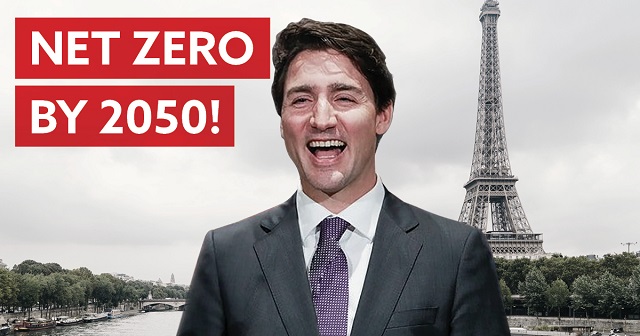Dan McTeague
Call out ‘net zero’ for what it is, a scam

From Canadians for Affordable Energy

Net Zero emissions by 2050. Have you heard this line? It is increasingly hard to miss. Every trendy business, bank, corporation and government boasts about their commitment to it. But what exactly do they mean by it?
In short, Net Zero by 2050 means our country either emits no greenhouse gases or offsets whatever it does emit through measures such as buying carbon credits or investing in carbon capture technology.
Net Zero has been a central project of groups such as the World Economic Forum, the United Nations and other globalist institutions. They’ve spent the past several years pressuring governments around the world to commit to Net Zero and to make those commitments legally binding, so it will be difficult for elected officials to roll them back in the future.
That’s what’s happening here in Canada. This has been a major priority for Justin Trudeau. The Liberals have spent years championing the push to Net Zero, mandating it by law in 2021.
But law or not, Net Zero isn’t actually going to happen.
It is a ludicrous goal, in part because achieving it would be unimaginably expensive. So expensive, in fact, governments the world over don’t even attempt to estimate the total cost. Whenever they’re asked, they just say “the cost of doing nothing will be higher.” But if they don’t know how expensive their own plan is, how on earth could they know that it would be cheaper than not doing it?
External estimates place the cost for Canada alone somewhere in the neighborhood of $2 trillion. That number is so staggering it is impossible to fully comprehend it. It is more than our nation’s entire Gross Domestic Product! Look at it this way — that is the equivalent of spending $1 a second for 63,417 YEARS.
But the fact Net Zero will ultimately fail doesn’t mean attempting it isn’t going to negatively affect your daily life. It will.
Under the umbrella of Net Zero you’ll find,
- Carbon taxes
- Clean Fuel Standards
- Just Transition
- Emissions caps
- Cancelled pipelines
- Electrification strategies
- Gas and diesel car bans
- Electric vehicle subsidies
- Costly building codes
- Curtailed food production
The list goes on and on.
But beyond the economic impact and the personal hardship, we must remember the end game of this Green Agenda isn’t really about reducing carbon emissions. No, it is much more insidious than that.
At the heart of this Net Zero movement is a desire to fundamentally change our economy and way of life. They are looking for a complete transition from the economy that has made Canada the great nation that it is.
“You will own nothing and be happy.” Remember those words attributed to Klaus Schwab, head of the World Economic Forum (WEF)? Well take those words to heart, because he means it.
The implications of Net Zero are broad and overreaching. And they will have the effect of fundamentally affecting our quality of life.
It will make energy more expensive. It will raise the cost of everything. It will make us less competitive in the global economy, especially against countries such as China because, you will not be surprised to learn, China has not signed on to this suicide pact. (But they are keen for other countries to stifle their economy in pursuit of this absurd goal, not least because they produce 70% of the world’s solar panels.)
Net Zero regulations, policies and mandates are a direct assault on affordable energy, and an affordable way of life. That is the goal of the Green agenda, and if they have their way, Canada, its standard of living and its way of life will suffer.
Net Zero is a scam.
Dan McTeague is President of Canadians for Affordable Energy
2025 Federal Election
I don’t believe these polls!

 Dan McTeague
Dan McTeague
Cards on the table, I’m skeptical of the current state of the polling in this election. My sense is that Mark Carney and the Liberals’ numbers are, at least in part, a byproduct of sympathetic pollsters over-sampling their key demographics, and those being trumpeted to high heaven by the publicly-funded media. That, coupled with voters’ justifiable annoyance at Donald Trump’s “51st State” cracks and tariff threats, has contributed to an illusion of enthusiasm, a sense that they are running away with this thing.
That said, one polling data point has struck me as being both real and important. A recent Abacus Data poll showed that, when you cut out all the distractions, Canadians’ biggest concern remains our inflated cost of living. And that is an issue which clearly favors Poilievre and the Conservatives.
That’s because the dire state of our economy can largely be laid at the feet of the Liberals, who’ve been running the show for the past decade. Yes, they’ve made a change at the top, but not much of one. On top of being a globe-trotting member of the “Green” Elite, and champion of environmentalist banking, Mark Carney was a Liberal advisor for years, a key part of the Trudeau “brain trust” — trust me, I use that term loosely — that cooked up a whole raft of economy smothering “Green” policies which have done nothing to reduce global carbon emissions, but have succeeded in lightening our wallets.
Under Trudeau, our annual GDP growth noticeably shifted from the 3% range towards the end of the Harper years to the 1% range more recently. Household debt-to-income ratios rose steadily in the same period, while real household spending per capita dropped 2-3% below 2019 levels by 2024, as costs and interest rates went up. Disposable income growth has been outpaced by inflation and taxes, and bankruptcy filings have risen 40% since just 2019.
Canadian food prices have exploded by 35-40%, with family spending up over 50% over the past decade. Consequently, food insecurity rose to 23% by 2023, from around 8% in 2015, and Food Banks Canada has reported a 78% surge in usage from 2019 to 2023.
Meanwhile, Canada’s national debt, which was just over $600 billion when Justin Trudeau was handed the federal credit card, has roughly doubled, reaching over $1.2 trillion by the time he left. And provincial debt has risen by about $1 trillion in the same period.
It’s a frightening financial snapshot. And many of these negatives can be attributed to the Liberals’ war on oil and gas, which remains — however much Carney might wish otherwise — the backbone of our national economy.
So much of the Liberals’ time and effort in government has been spent kneecapping the resource sector, and for purely ideological reasons. From Bill C-48, the Oil Tanker Moratorium Act of 2019, which significantly reduces our ability to sell oil and gas abroad, to Bill C-69, which added mountains of red tape for infrastructure projects, so much so that it was nicknamed the “No More Pipelines” Act.
You’ll remember that the Supreme Court ruled the “No More Pipelines” act largely unconstitutional two years ago. Even so, Carney recently said he has no intention of repealing it, prompting Poilievre to tweet out, “This Liberal law blocked BILLIONS of dollars of investment in oil & gas projects, pipelines, LNG plants, mines, and so much more,” with an excellent infographic attached, listing the various cancelled energy projects throughout Canada since the Liberals came to power.
And then of course, there’s the Consumer Carbon Tax, which started out at $20 per tonne of CO2 emitted in 2019, small enough that many Canadians barely noticed they were paying it, but increased every year until it hit $80 per tonne.
By that point it became so noticeable and unpopular that the Liberals felt they had no choice but to “cancel” it (“zero it out” is more accurate), before it could reach the $170 by 2030 which they’d planned. Still, it remains on the books, ready to be raised again, without a vote, if Carney so chooses.
Even if he doesn’t, Carney has doubled down on the Industrial Carbon Tax. While the Liberals claim this is an improvement because it isn’t paid by working Canadians, only by big evil “polluters.” Of course, they said something similar about the Consumer Tax, that by some financial wizardry, we regular folks would get back more than we paid in, which turned out to be total bunk.
Meanwhile, the Industrial Tax makes our lives more expensive in essentially the same way as the Consumer Tax. It raises the cost of doing business, of heating our homes, of filling up our car, of our grocery bills. It just does so by a less direct route, by taxing businesses instead of individuals, so that we pay when the price of goods and services goes up in response.
The Industrial Carbon Tax, much like Trudeau’s Clean Fuel Regulations, is ultimately a hidden tax, and that suits Carney just fine. He’d prefer that we not know who to blame as our cost of living skyrockets.
The Liberal Party’s economic record over since 2015 has been atrocious, and it will be no different under Mark Carney. He is complicit, and he continues to support policies which would make us poorer, like Bill S-243, the “Climate-Aligned Finance Act,” which Carney testified before the Senate in support of last year. That bill sought to make it nearly impossible for banks to invest in, or loan money to, oil and gas projects in Canada, and tried to force financial institutions to appoint board members ideologically opposed to fossil fuels.
Canada needs to change course, and soon. As things stand, it will be tough for even a good captain to navigate us through the rough seas the Liberals have steered us into over the past ten years. A few more, and with Mark Carney at the helm, might make that impossible.
Dan McTeague is President of Canadians for Affordable Energy.
Support Dan’s Work to Keep Canadian Energy Affordable!
Canadians for Affordable Energy is run by Dan McTeague, former MP and founder of Gas Wizard. We stand up and fight for more affordable energy.
2025 Federal Election
Don’t let the Liberals fool you on electric cars

 Dan McTeague
Dan McTeague
“The Liberals, hoodwinked by the ideological (and false) narrative that EVs are better for the environment, want to force you to replace the car or truck you love with one you can’t afford which doesn’t do what you need it to do.”
The Liberals’ carbon tax ploy is utterly shameless. For years they’ve been telling us that the Carbon Tax was a hallmark of Canadian patriotism, that it was the best way to save the planet, that it was really a “price on pollution,” which would ultimately benefit the little guy, in the form of a rebate in which Canadians would get back all the money they paid in, and more!
Meanwhile big, faceless Captain Planet villain corporations — who are out there wrecking the planet for the sheer fun of it! — will shoulder the whole burden.
But then, as people started to feel the hit to their wallets and polling on the topic fell off a cliff, the Liberals’ newly anointed leader — the environmentalist fanatic Mark Carney — threw himself a Trumpian signing ceremony, at which he and the party (at least rhetorically) kicked the carbon tax to the curb and started patting themselves on the back for saving Canada from the foul beast. “Don’t ask where it came from,” they seem to be saying. “The point is, it’s gone.”
Of course, it’s not. The Consumer Carbon Tax has been zeroed out, at least for the moment, not repealed. Meanwhile, the Industrial Carbon Tax, on business and industry, is not only being left in place, it’s being talked up in exactly the same terms as the Consumer Tax was.
No matter that it will continue to go up at the same rate as the Consumer Tax would have, such that it will be indistinguishable from the Consumer Tax by 2030. And no matter that the burden of that tax will ultimately be passed down to working Canadians in the form of higher prices.
Of course, when that happens, Carney & Co will probably blame Donald Trump, rather than their own crooked tax regime.
Yes, it is shameless. But it also puts Pierre Poilievre and the Conservatives in a bind. They’ve been proclaiming their intention to “Axe the Tax” for quite some time now. On the energy file, it was pretty much all you could get them to talk about. So much so that I was worried that upon entering government, they might just go after the low hanging fruit, repeal the Carbon Tax, and move on to other things, leaving the rest of the rotten Net-Zero superstructure in place.
But now, since the Liberals beat them to it (or claim they did,) the Conservatives are left grasping for a straightforward, signature policy which they can use to differentiate themselves from their opponents.
Poilievre’s recently announced intention to kill the Industrial Carbon Tax is welcome, especially at a time when Canadian business is under a tariff threat from both the U.S. and China. But that requires some explanation, and as the old political saying goes, “If you’re explaining, you’re losing.”
There is one policy change however, which comes to mind as a potential replacement. It’s bold, it would make the lives of Canadians materially better, and it’s so deeply interwoven with the “Green” grift of the environmentalist movement of which Mark Carney is so much a part that his party couldn’t possibly bring themselves to steal it.
Pierre Poilievre should pledge to repeal the Liberals’ Electric Vehicle mandate.
The EV mandate is bad policy. It forces Canadians to buy an expensive product — EVs cost more than Internal Combustion Engine (ICE) vehicles even when the federal government was subsidizing their purchase with a taxpayer-funded rebate of $5,000 per vehicle, but that program ran out of money in January and was discontinued. Without that rebate, EVs haven’t a prayer of competing with ICE vehicles.
EVs are particularly ill-suited for Canada. Their batteries are bad at holding a charge in the cold. Even in mild weather, EVs aren’t known for their reliability, a major downside in a country as spread out as ours. Maybe it’ll work out if you live in a big city, but what if you’re in the country? Heaven help you if your EV battery dies when you’re an hour away from everywhere.
Moreover, Canada doesn’t have the infrastructure to support a total replacement of gas-and-diesel driven vehicles with EVs. Our already-strained electrical grid just doesn’t have the capacity to support millions of EVs being plugged in every night. Natural Resources Canada estimates that we will need somewhere in the neighborhood of 450,000 public charging stations to support an entirely electric fleet. At the moment, we have roughly 30,000. That’s a pretty big gap to fill in ten years.
And that’s another fact which doesn’t get nearly as much attention as it should. The law mandates that every new vehicle sold in Canada must be electric by 2035. Maybe that sounded incredibly far in the future when it was passed, but now it’s only ten years away! That’s not a lot of time for these technological problems or cost issues to be resolved.
So the pitch from Poilievre here is simple.
“The Liberals, hoodwinked by the ideological (and false) narrative that EVs are better for the environment, want to force you to replace the car or truck you love with one you can’t afford which doesn’t do what you need it to do. If you vote Conservative, we will fix that, so you will be free to buy the vehicle that meets your needs, whether it’s battery or gas powered, because we trust you to make decisions for yourself. Mark Carney, on the other hand, does not. We won’t just Axe the Tax, we will End the EV Mandate!”
A decade (and counting) of Liberal misrule has saddled this country with a raft of onerous and expensive Net-Zero legislation I’d like to see the Conservative Party campaign against.
These include so-called “Clean Fuel” Regulations, Emissions Caps, their war on pipelines and Natural Gas terminals, not to mention Bill C-59, which bans businesses from touting the environmental benefits of their work if it doesn’t meet a government-approved standard.
But the EV mandate is bad for Canada, and terrible for Canadians. A pledge to repeal it would be an excellent start.
Dan McTeague is President of Canadians for Affordable Energy.
-

 Also Interesting1 day ago
Also Interesting1 day agoMortgage Mayhem: How Rising Interest Rates Are Squeezing Alberta Homeowners
-

 2025 Federal Election1 day ago
2025 Federal Election1 day agoConservative Party urges investigation into Carney plan to spend $1 billion on heat pumps
-

 Alberta2 days ago
Alberta2 days agoAlberta’s embrace of activity-based funding is great news for patients
-

 2025 Federal Election2 days ago
2025 Federal Election2 days agoCommunist China helped boost Mark Carney’s image on social media, election watchdog reports
-

 COVID-192 days ago
COVID-192 days agoMassive new study links COVID jabs to higher risk of myocarditis, stroke, artery disease
-

 2025 Federal Election1 day ago
2025 Federal Election1 day agoFifty Shades of Mark Carney
-

 Also Interesting2 days ago
Also Interesting2 days agoExploring Wildrobin Technological Advancements in Live Dealer Games
-

 2025 Federal Election1 day ago
2025 Federal Election1 day agoCorporate Media Isn’t Reporting on Foreign Interference—It’s Covering for It





